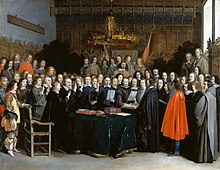Interstate system (world-systems theory)
[1][2] Immanuel Wallerstein wrote that the development of a capitalist world-economy created all of the major institutions of the modern world, including social classes, nations, households and states.
Juridical sovereignty could range from total to nil, as could the state's ability to impose decisions, project power, or control the flows of capital, commodities and labor.
Likewise the proletariat has an interest in uniting on a world scale to better combat internationally mobile capital, however the mechanisms most readily available for improving local conditions exist in state-based organizations.
This takes the form of greater enforcement of interstate rules to maintain liberal norms and the hegemon's diplomatic, military, political, ideological, and cultural power.
[11] World-systems theorists have used the interstate system to explain the perceived failures of the state socialist economies of the eastern bloc in abolishing commodity fetishism and other negative effects of a capitalist world-economy at the national level.
[12] Wallerstein believed that the fact that the eastern bloc had largely avoided disrupting the world economy was proof of the effectiveness of the interstate system in disincentivizing global class conflict.
[13] Wallerstein's use of the interstate system to explain international relations was criticised by a number of Western Marxists and non-Marxists for what they saw as economism, or for failing to account for "the relative autonomy of the state" from economic factors, claiming that Wallerstein saw the interstate system as a mechanical consequence of capital accumulation.
